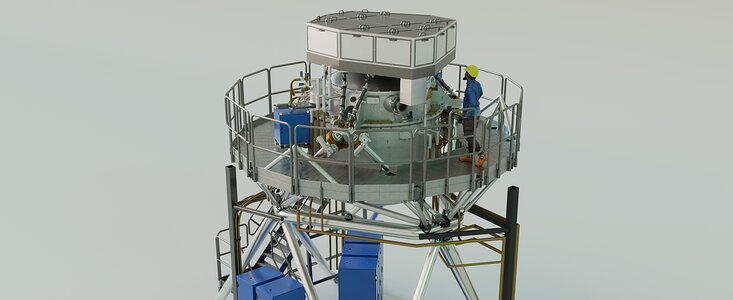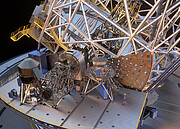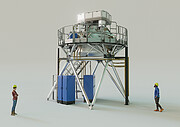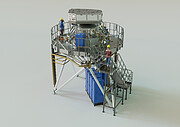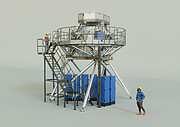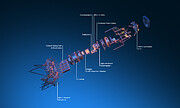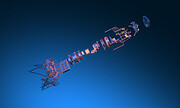Mededeling
Definitief ontwerp van het METIS-instrument van de ELT is voltooid
14 mei 2024
De Mid-infrared ELT Imager and Spectrograph, of METIS, heeft de definitieve ontwerp-evaluatie doorstaan, en ESO heeft nu groen licht gegeven voor de productie van alle onderdelen van het instrument. METIS is een geavanceerd multifunctioneel instrument dat zal werken op ESO’s komende Extremely Large Telescope (ELT). Het is het eerste ELT-instrument dat formeel door de definitieve ontwerp-evaluatie is gekomen. Dit is een belangrijke stap voor het METIS-consortium, het ELT-project en de Europese gemeenschap van instrumentenbouwers.
METIS is een eerste-generatie instrument van ’s werelds grootste oog op de hemel – de ELT – wat betekent dat het in actie komt zodra, of kort nadat, de telescoop zijn eerste hemelwaarnemingen gaat doen. Het instrument heeft een breed scala aan wetenschappelijke doelen, van het onderzoeken van de ontstaansgeschiedenis van ons zonnestelsel tot het bestuderen van de centra van sterrenstelsels en de daar aanwezige raadselachtige superzware zwarte gaten. Maar de wetenschappelijke prioriteit van METIS ligt bij het onderzoek van planeet-vormende schijven en recent ontstane en nabije exoplaneten.
Het ontwerpproces is één van de stappen op weg van concept naar definitief instrument – een proces dat bij zulke grote, complexe en geavanceerde instrumenten jaren in beslag neemt. METIS bereikte zijn eerste mijlpaal bij zijn voorlopige ontwerpevaluatie in 2020, waarna eind 2022 het ontwerp van de belangrijkste componenten van het instrument werd afgerond. Nu ook de definitieve ontwerp-fase is voltooid, kan het consortium de productiefase van alle onderdelen van het instrument opstarten. De afronding van de evaluatie markeert de spannende overgang van het beschrijven van METIS in technische documenten naar het bouwen, assembleren en testen van het instrument.
METIS is ontworpen om waarnemingen te doen in het midden-infrarood. Daarmee is het instrument bij uitstek geschikt om koude of in stof gehulde objecten te bestuderen. Waar hete objecten van duizenden graden, zoals onze zon, voornamelijk zichtbaar licht uitstralen, stralen koudere objecten, zoals planeten of stofwolken, vooral in het midden-infrarood. Door licht in dit golflengtegebied te analyseren zal METIS onderzoeken hoe de vorming van sterren en planeten in wolken van gas en stof verloopt en kan het instrument door het stof in de centra van sterrenstelsels heen kijken om hun superzware zwarte gaten te bestuderen. Daarnaast zal METIS naar verwachting spannende bijdragen leveren bij de zoektocht naar leefbare exoplaneten, door kleine, rotsachtige exoplaneten waar te nemen en de temperatuur, het weer en de chemische samenstelling van hun atmosferen te analyseren.
METIS is een geavanceerd drie-in-één instrument. Het heeft een camera om beelden van de hemel vast te leggen, een spectrograaf om het licht te splitsen in zijn verschillende kleuren of golflengten, en een eigen adaptieve optische module die – in samenwerking met de adaptieve telescoopspiegels van de ELT – storende turbulenties in de aardatmosfeer kan corrigeren. Het complete instrument zit verpakt in een cryostaat, die zijn temperatuur op minus 230 graden Celsius of nog lager houdt, zodat zijn eigen warmte de infraroodmetingen niet kan verstoren.
Bekijk voor meer informatie over METIS en de mensen, techniek en wetenschap erachter de video ‘Meet METIS, a multi-tool instrument for the ELT’.
Meer informatie
Het METIS-consortium bestaat uit NOVA (Nederlandse Onderzoekschool voor Astronomie, vertegenwoordigd door de Universiteit Leiden), het Max-Planck-Institut für Astronomie (MPIA, gevestigd in Heidelberg, Duitsland), de Universität zu Köln (Duitsland), het UK Astronomy Technology Centre (UKATC, in Edinburgh, Schotland, VK), de KU Leuven (België), het Commissariat à l'énergie atomique et aux énergies alternatives (CEA) te Paris Saclay (Frankrijk), het Center for Astrophysics and Gravitation (CENTRA, Universiteit van Lissabon, Portugal), ETH Zürich (Zwitserland), A* (een Oostenrijkse samenwerking vertegenwoordigd door de Universiteit van Wenen, de Universiteit van Innsbruck, de Universiteit van Graz, de Universiteit van Linz en RICAM Linz, de Oostenrijkse Academie van Wetenschappen), de University of Michigan at Ann Arbor (VS), Academia Sinica Institute of Astronomy and Astrophysics in Taipei (Taiwan), en de Universiteit van Luik (België), met bijdragen van ESO.
Links
Contact
Christoph Haupt
METIS Project Manager bij ESO
Mobiel: +49 151 14176113
E-mail: Christoph.Haupt@eso.org
Ralf Siebenmorgen
METIS Project Scientist bij ESO
Mobiel: +49 1575 088 6576
E-mail: Ralf.Siebenmorgen@eso.org
Bernhard R. Brandl
METIS Principal Investigator
Sterrewacht Leiden, Universiteit Leiden
Mobiel: +31 6211 85430
E-mail: brandl@strw.leidenuniv.nl
Bárbara Ferreira
ESO Media Manager
Garching bei München, Duitsland
Tel.: +49 89 3200 6670
E-mail: press@eso.org
Over de Mededeling
| Id: | ann24007 |
Our use of Cookies
We use cookies that are essential for accessing our websites and using our services. We also use cookies to analyse, measure and improve our websites’ performance, to enable content sharing via social media and to display media content hosted on third-party platforms.
ESO Cookies Policy
The European Organisation for Astronomical Research in the Southern Hemisphere (ESO) is the pre-eminent intergovernmental science and technology organisation in astronomy. It carries out an ambitious programme focused on the design, construction and operation of powerful ground-based observing facilities for astronomy.
This Cookies Policy is intended to provide clarity by outlining the cookies used on the ESO public websites, their functions, the options you have for controlling them, and the ways you can contact us for additional details.
What are cookies?
Cookies are small pieces of data stored on your device by websites you visit. They serve various purposes, such as remembering login credentials and preferences and enhance your browsing experience.
Categories of cookies we use
Essential cookies (always active): These cookies are strictly necessary for the proper functioning of our website. Without these cookies, the website cannot operate correctly, and certain services, such as logging in or accessing secure areas, may not be available; because they are essential for the website’s operation, they cannot be disabled.
Functional Cookies: These cookies enhance your browsing experience by enabling additional features and personalization, such as remembering your preferences and settings. While not strictly necessary for the website to function, they improve usability and convenience; these cookies are only placed if you provide your consent.
Analytics cookies: These cookies collect information about how visitors interact with our website, such as which pages are visited most often and how users navigate the site. This data helps us improve website performance, optimize content, and enhance the user experience; these cookies are only placed if you provide your consent. We use the following analytics cookies.
Matomo Cookies:
This website uses Matomo (formerly Piwik), an open source software which enables the statistical analysis of website visits. Matomo uses cookies (text files) which are saved on your computer and which allow us to analyze how you use our website. The website user information generated by the cookies will only be saved on the servers of our IT Department. We use this information to analyze www.eso.org visits and to prepare reports on website activities. These data will not be disclosed to third parties.
On behalf of ESO, Matomo will use this information for the purpose of evaluating your use of the website, compiling reports on website activity and providing other services relating to website activity and internet usage.
Matomo cookies settings:
Additional Third-party cookies on ESO websites: some of our pages display content from external providers, e.g. YouTube.
Such third-party services are outside of ESO control and may, at any time, change their terms of service, use of cookies, etc.
YouTube: Some videos on the ESO website are embedded from ESO’s official YouTube channel. We have enabled YouTube’s privacy-enhanced mode, meaning that no cookies are set unless the user actively clicks on the video to play it. Additionally, in this mode, YouTube does not store any personally identifiable cookie data for embedded video playbacks. For more details, please refer to YouTube’s embedding videos information page.
Cookies can also be classified based on the following elements.
Regarding the domain, there are:
- First-party cookies, set by the website you are currently visiting. They are stored by the same domain that you are browsing and are used to enhance your experience on that site;
- Third-party cookies, set by a domain other than the one you are currently visiting.
As for their duration, cookies can be:
- Browser-session cookies, which are deleted when the user closes the browser;
- Stored cookies, which stay on the user's device for a predetermined period of time.
How to manage cookies
Cookie settings: You can modify your cookie choices for the ESO webpages at any time by clicking on the link Cookie settings at the bottom of any page.
In your browser: If you wish to delete cookies or instruct your browser to delete or block cookies by default, please visit the help pages of your browser:
Please be aware that if you delete or decline cookies, certain functionalities of our website may be not be available and your browsing experience may be affected.
You can set most browsers to prevent any cookies being placed on your device, but you may then have to manually adjust some preferences every time you visit a site/page. And some services and functionalities may not work properly at all (e.g. profile logging-in, shop check out).
Updates to the ESO Cookies Policy
The ESO Cookies Policy may be subject to future updates, which will be made available on this page.
Additional information
For any queries related to cookies, please contact: pdprATesoDOTorg.
As ESO public webpages are managed by our Department of Communication, your questions will be dealt with the support of the said Department.
